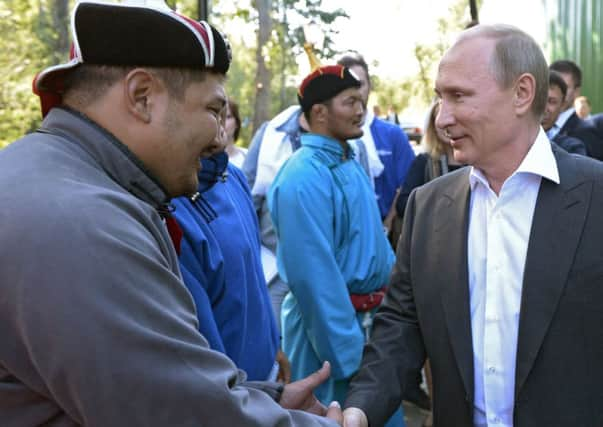Russia’s backlash vow over further EU sanctions


The EU has said measures targeting Russian businessmen and regime figures will come in tomorrow but could be postponed if Moscow withdraws its troops.
Vladimir Putin’s government denies it has forces in Ukraine, but there is widespread evidence that it does and Russian troops have been captured.
Advertisement
Hide AdAdvertisement
Hide AdThe Russian foreign ministry said in a statement yesterday: “As for the new list of sanctions from the European Union, if they are passed there will undoubtedly be a reaction from our side.”
Sanctions would target the rebel leadership in the eastern Donetsk and Luhansk regions, which are attempting to break away from Kiev; officials in Crimea, which was annexed by Russia in March, and Russian “decision-makers and oligarchs”.
There was an uneasy calm in eastern Ukraine yesterday after Ukrainian forces and pro-Russian separatists signed a ceasefire on Friday, as part of a drive to end a war that has triggered a crisis in relations between Russia and the West.
The peace road map, approved by envoys in the Belarus capital Minsk, includes the exchange of prisoners-of-war. A separatist leader said this process would begin this weekend, though the Ukrainian side said details were still being worked out.
The two sides remain far apart on the future of the rebel-held areas in eastern Ukraine and both residents and combatants said they did not expect the ceasefire to last long.
Andriy Lysenko, the spokesman for Ukraine’s National Security and Defence Council, said the rebels had fired 10 times on Ukrainian troops since the truce, and unconfirmed reports also say a number of fighters from Ukraine’s Aydar battalion were ambushed and killed after the ceasefire.
But the heavy artillery barrages that took place last week appear to have silenced.
The rebels have been attempting to take Mariupol, a port city which lies along the Sea of Azov, north of the Black Sea. This would allow them to create a coastal corridor and link up to Russian-controlled Crimea, but fighting appears to have halted since the truce came into effect.
Advertisement
Hide AdAdvertisement
Hide AdIn rebel-held Donetsk, the region’s industrial hub, separatist commanders said they did not believe the five-month war was over.
“The ceasefire is looking good for now but we know they [the Ukrainian side] are only using it to bring in more forces here and ammunition and then to hit us with renewed strength,” said one rebel commander known as Montana. “Come what may, I would not trust [Ukrainian President Petro] Poroshenko. And it’s not him making the call anyway but the Americans and that is even worse.”
Poroshenko agreed to the ceasefire after Ukraine accused Russia of sending troops and arms on to its territory in support of the separatists, who had suffered big losses over the summer.
Moscow denies sending troops or arming the rebels.
“I am sure that Ukraine as a state and I as leader of that state are doing everything possible to achieve peace in our country,” Poroshenko said told BBC News HardTalk programme on Friday, after the Nato summit in Wales.
Moscow responded to a previous round of US and EU sanctions by banning most Western food imports, such as Scottish and Norwegian salmon, Polish apples, French cheese and Italian salami.
The prime minister of the rebels’ self-proclaimed Donetsk People’s Republic, Alexander Zakharchenko, said his side would hand over its POWs to Ukraine this weekend.
Lysenko said Ukraine wanted the exchange to take place “as fast as possible” but gave no time frame. He said the rebels were holding more than 200 Ukrainians captive.
The peace deal also envisages the creation of a humanitarian corridor for refugees and aid.
Advertisement
Hide AdAdvertisement
Hide AdBefore the ceasefire, fighting had raged for days on the outskirts of Donetsk, especially near the airport, which remains in government hands, and around Mariupol, where government forces have been trying to repel a major rebel offensive Kiev says was backed by Russian troops.
All was quiet yesterday in and around Mariupol, whose port is crucial for Ukraine’s steel exports.
“Many of my men had their first good sleep in days,” said one Ukrainian army officer.
In Donetsk, some residents complained of sporadic shelling overnight. “I don’t know what ceasefire we are talking of, if there was shooting again. This is no ceasefire but a theatre,” said Donetsk resident Ksenia.
“This war will go on for five to nine years. Slavs are killing Slavs, there can be nothing worse than that.”